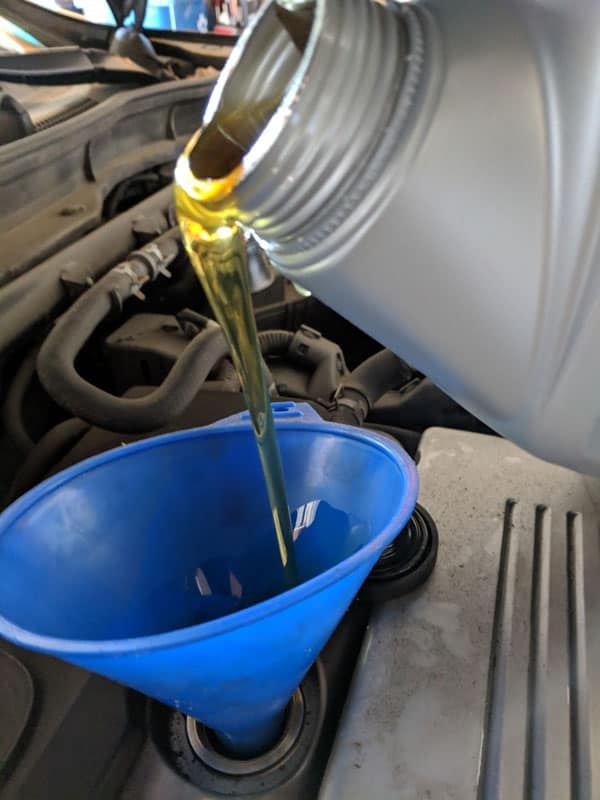What Happens If You Don’t Change The Oil In Your Car?
Have you been putting off getting your oil changed in your car and are now wondering if you are damaging your engine? Neglecting to change your oil for long periods of time can have negative consequences for your car engine long term. That’s why it’s important to follow your vehicle manufacturers recommend oil change intervals.
But what if you’ve already traveled 10,000 miles without changing your oil? Have you damaged your engine? What happens when you don’t change the oil in your car?
Table of Contents
1. Worse Engine Performance
First and foremost failing to change the oil in your car’s engine will lead to worse engine performance. Oil over time if left in an engine will start to turn into engine sludge. Engine sludge is essentially engine oil that is no longer fluid.
As engine oil breaks down and turns to sludge it thickens up until it can no longer flow through your engine, preventing it from doing it’s main job of lubricating the internals of your engine.
Because the engine oil can no longer properly lubricate the internals of the engine this will cause excess friction between the moving parts which will then cause the engine to work harder and lose some performance.
2. Voided Vehicle Warranty
If your car still has a warranty on it it’s important to get your oil changed based on your vehicle manufacturers’ recommendations. Going past the recommended oil change interval without your oil changed can void the vehicle warranty on your car. That’s why you should follow the vehicle manufacturers’ recommended oil change intervals while your car is still under warranty.
3. Engine Failure
Never changing the oil in an engine can eventually lead to total engine failure. As the oil turns to sludge it will build up inside of the engine. When sludge starts to build up the engine will have to work harder to remain operational. Eventually, the excess sludge and heat buildup from the engine working harder can lead to the engine locking up and needing to be rebuilt or replaced. What do you think is cheaper? Changing your oil every few months or replacing your car’s engine?
How Long Can You Go Without An Oil Change?
I’d like to start by saying you should always follow the recommended oil change intervals set by your vehicle manufacturer. Vehicle manufacturers will stress test engines and then based on those results determine a recommended oil change interval that could be anywhere from 3,000-7,000 miles or once per year, whichever comes first.
The type of oil you use should also determine how long you should go between oil changes. Conventional oil will not hold up as long as synthetic engine oil so keep that in mind. If your vehicle manufacturer recommends conventional oil you can use synthetic oil for added engine protection as synthetic oil will lubricate an engine better than conventional engine oil and will also be more fluid than conventional oil on cold engine starts.
What Happens If You Don’t Change Your Oil For 10,000 miles?
If you neglect to change your oil for 10,000 miles it can start to have negative consequences on your engine performance. The longer you go without changing your oil the more chance you take for your engine oil to turn to sludge and start to clog up your engine.
While not changing your oil for 10,000 miles once likely doesn’t mean the end of your engine it may mean a decrease in engine performance in the form of reduced horsepower and torque.
If you consistently go 10,000 miles without changing your oil this will likely lead to excess sludge buildup and then engine failure.
Is it Bad To Add Oil Without Changing It? Can I Just Top Up My Engine Oil?
While topping off your oil between oil changes is fine, neglecting to change your oil with new oil can result in your engine oil breaks down into engine sludge. Some cars may burn oil in between oil changes so refilling your engine oil in between oil changes is fine. Just make sure that whenever your oil needs to be replaced you drain and refill the engine with new engine oil. Otherwise, you will be causing long term harm to your engine in the form of engine sludge and accelerated engine wear.
While the main job of engine oil is to lubricate the internals of an engine, engine oils’ secondary purpose is to trap any dirt and contaminants to keep them from being recirculated throughout the engine.
As you drive around your engine will suck in air and any dirt and contaminants that are not filtered out by your engine air filter. These contaminants will be trapped inside the oil and will be removed the next time you change your oil. If you neglect to change your engine oil more and more contaminants and dirt will start to build up in your engine and will turn to engine sludge.
Can You Put Too Much Oil In A Car?
If it’s bad to run an engine with not enough engine oil can it be bad to put too much oil in a car?
Yes, you can definitely put too much oil in a car. Each engine is different and will have a different oil capacity. The larger the displacement of the engine, the more oil it will take to keep it properly lubricated. Adding too much oil can cause engine oil to go into places oil should not be present in the engine. Places like inside the combustion chamber.
Engine oil is designed to lubricate the internals of your engine, it’s not designed to be inside the combustion chamber in a normal four-stroke engine (engine oil and gasoline are mixed together and used as the propellant for two-stroke engines).
If excess engine oil is added it can be forced into the engine cylinders which is not good news for the pistons that are designed to compress air and fuel, not engine oil.
Before you decide to change the oil in your car it’s best to determine how many quarts are required for your specific engine. If you have a smaller four-cylinder engine it may only take 5 quarts of engine oil to change your oil. If you have a large displacement V8 engine then it may take 8 or more quarts to change your oil.
Will My Car Run Better After An Oil Change?
While changing your oil in your car is good preventive maintenance it won’t significantly increase the performance of your engine. If you’ve neglected to change your oil for a long period changing the oil in your car can bring back some performance that you may have lost but it won’t increase the performance past the normal baseline.
Does Low Oil Affect Acceleration?
If your car is low on oil it can negatively affect the performance of your engine and the acceleration of your car. When your engine is low on oil the friction between the moving parts of the engine will be increased. As friction is increased your engine will have to work harder to operate, decreasing the overall performance of your engine.
Low engine oil levels can have other negative effects on your engine as well. Low engine oil levels can lead to additional wear and tear on the internals of your engine over time. When engine oil levels are low the oil won’t be able to properly lubricate the moving parts of an engine metal on metal contact will occur and accelerate the wear of the internals in the engine.
Is it OK to Change Your Oil Once A Year?
Depending on how many miles you drive in a year changing your oil once per year would be fine as long as the mileage is driven is still under the recommended oil change interval set by your vehicle manufacturer.
The vast majority of people will drive a higher mileage in a year than their vehicle manufacturer recommends between oil changes. The average mileage for Americans is around 12,000 miles driven per year which is way over most vehicle manufacturers recommended oil change intervals.
If you have a car that you rarely drive or have multiple cars that you drive then it may be fine for you to only change your engine oil once per year.
While there are some engine oils that have been developed that promise that you only need to change your oil once per year I’d still be hesitant to only change the oil on my car once per year.
Is High Mileage Oil Worth It?
If you have a high mileage car then using high mileage engine oil is definitely worth it. High mileage engine oil will have extra detergents to help condition the seals and gaskets inside of your engine. These conditioners will allow the seals and gaskets to remain pliable and help prevent leaks that can occur over time.
Another nice thing about high mileage engine oil is that it costs about as much as normal synthetic engine oil. So if you already use synthetic engine oil in your car and would like to make the switch to high mileage synthetic oil it likely won’t cost you any more than you are already spending.
Can Synthetic Oil Last A Year?
Most people will need to change their oil before a full year is up, even when using synthetic oil. Mobil 1 now has a product called Mobil 1 annual protection that says that you can go a full year, or 20,000 miles, whichever comes first without needing to change your car’s oil.
However, I’d be hesitant to change my car’s oil every 20,000 miles, especially if most oil change intervals are in the 5,000-7,000 mile range. Mobil 1 recommends the use of their Mobil 1 extended performance engine oil filter in combination with the Mobil 1 annual protection oil to better protect your car’s engine during that year or 20,000 miles.
It should be noted that if your car is still under warranty you should still follow your vehicle manufacturers recommend oil change interval unless you want to risk losing your car’s warranty.
Mobil 1 annual protection – https://amzn.to/2Rpfuyf
Related Questions
Does Synthetic Oil Go Bad? Synthetic oil will go bad and need to be replaced just like conventional oil. However, synthetic oil will usually last longer before needing to be replaced when compared to conventional oil. Synthetic oil is overall better than conventional oil in every aspect, but expect to pay more for synthetic oil than conventional oil.
How Many Months Does Synthetic Oil Last? While synthetic oil performs better and lasts longer than conventional oil it’s still a good idea to replace your engine oil based on when your vehicle manufacturer recommends. If you follow these guidelines you will have better performing oil but will also keep the inside of your engine clean.
How long your synthetic engine oil will last will really be determined by how many miles you drive each day which will add up over time. I use synthetic oil and can usually go 6-8 months in between oil changes. If I take a long trip across the country then that means I’d need to replace my synthetic engine oil much sooner.
You may be able to get by with using synthetic oil to make the interval between oil changes a bit longer but I wouldn’t stretch it over 1,000 miles over what is recommended by your vehicle manufacturer.

